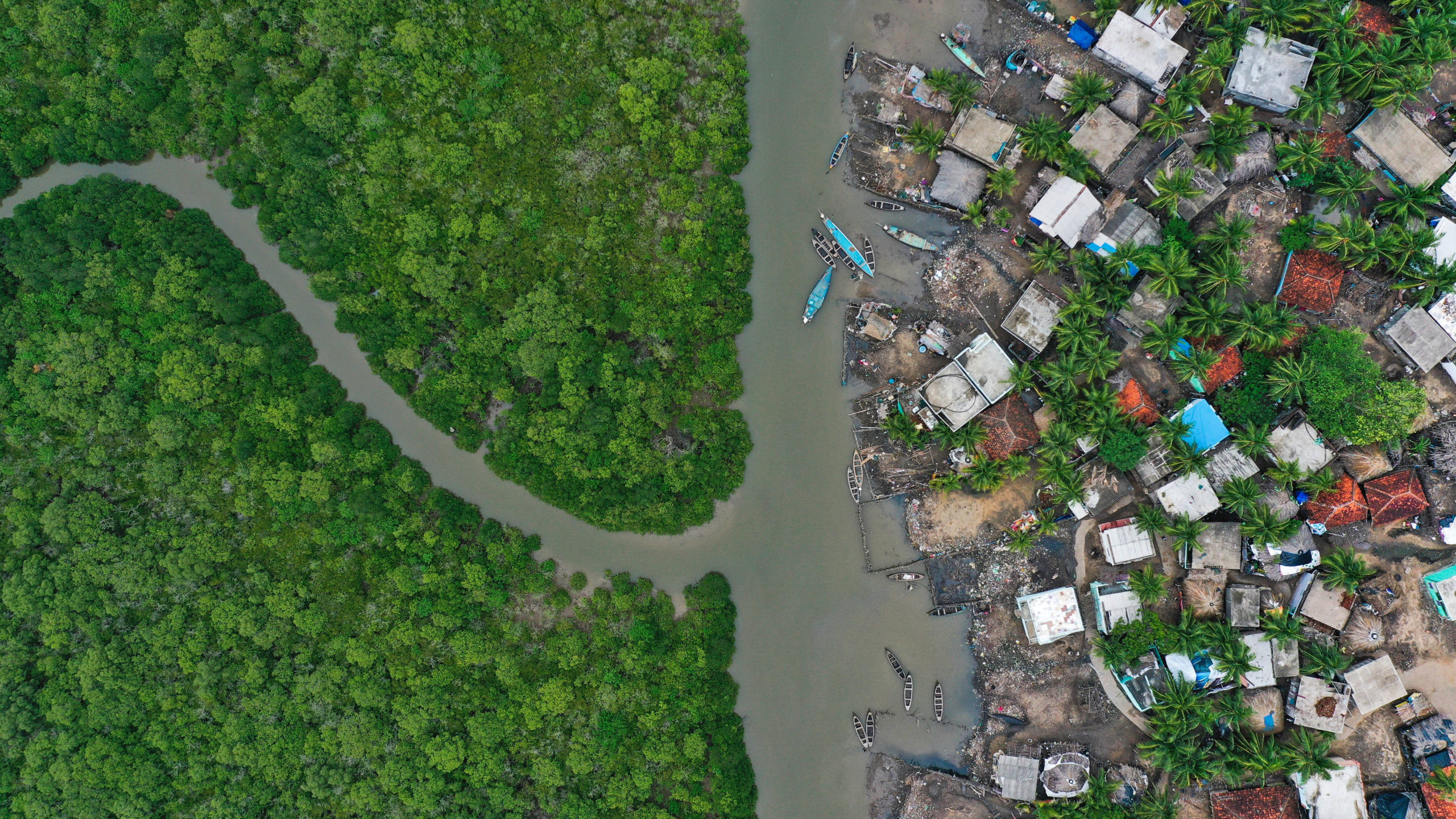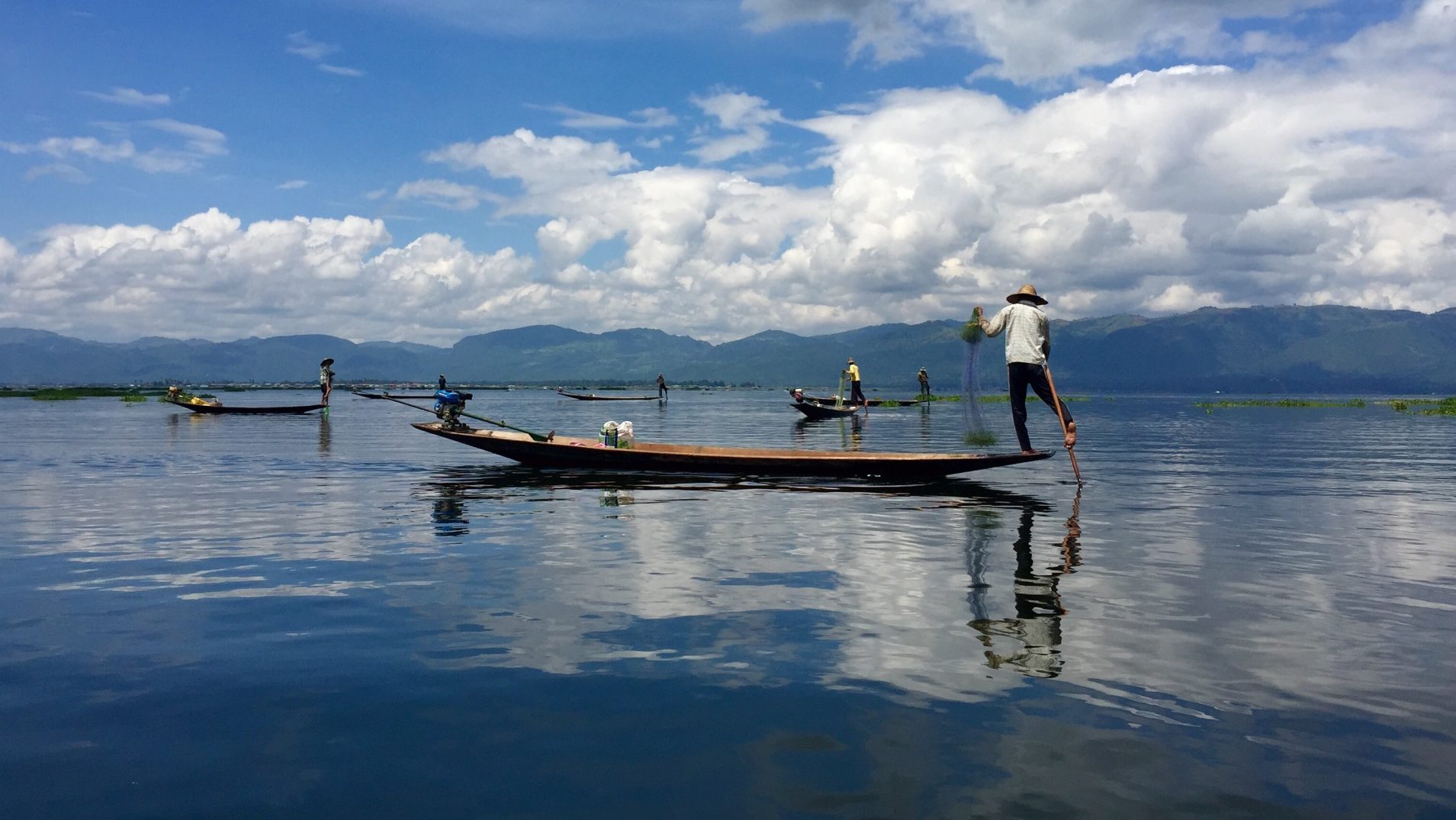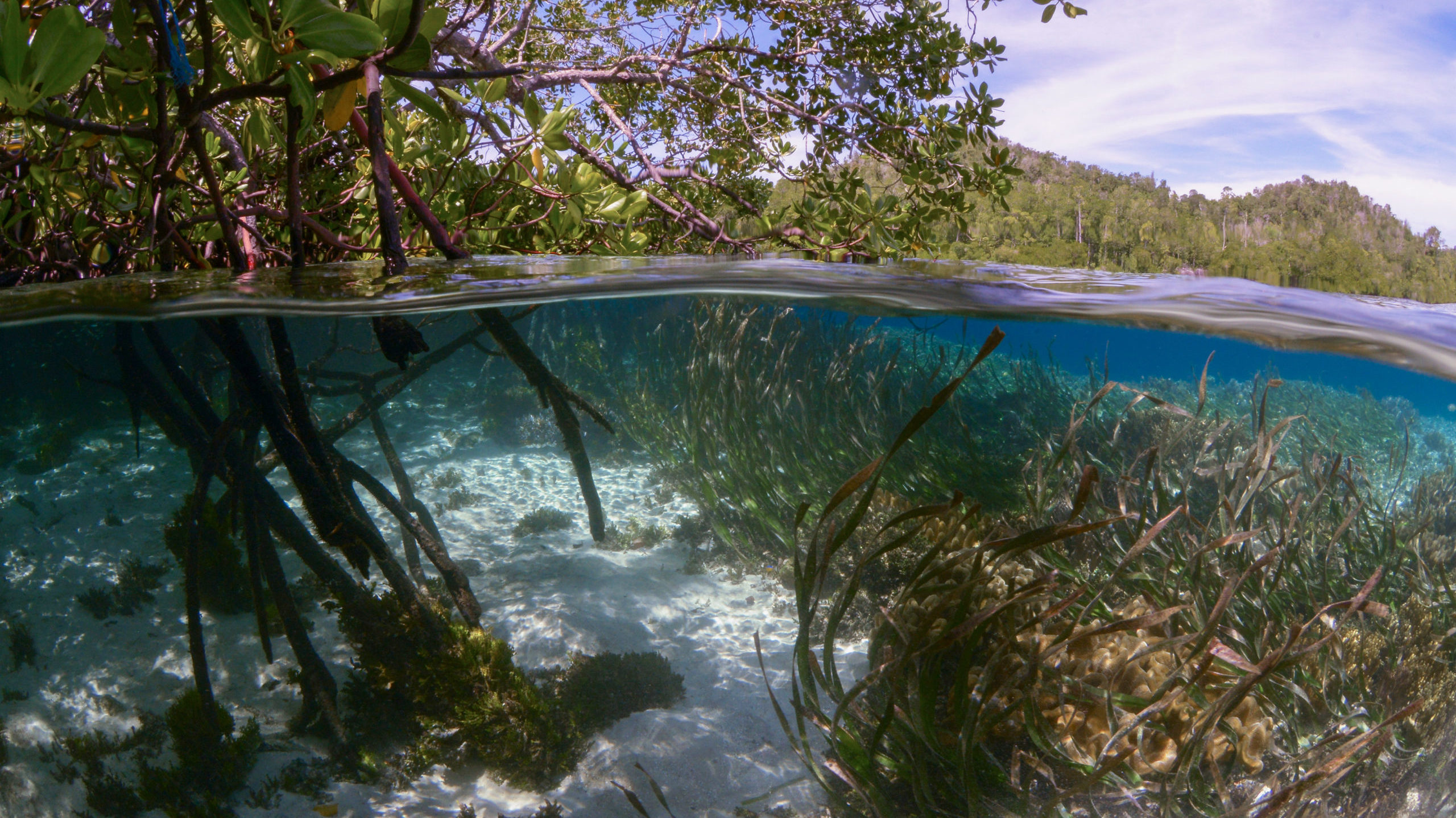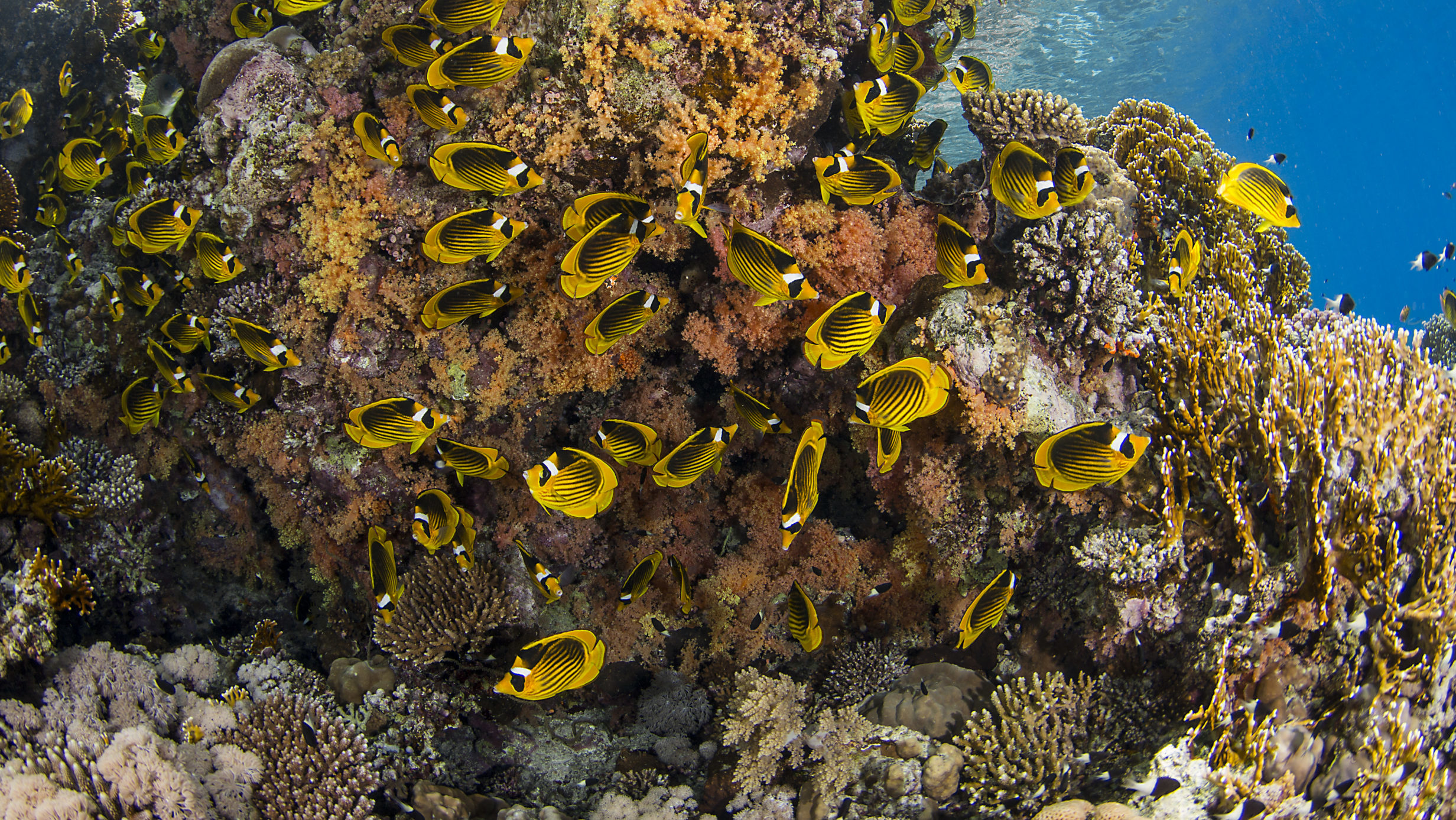Water quality threatens to undermine the success of many conservation initiatives, but there are numerous ways that ocean funders can address this cross-cutting issue through their existing strategies. This guide provides ways to engage on water quality to achieve ocean objectives, featured by issue area.

Photo: OceanImageBank / SrikanthMannepuri
If you care about 30×30 goals and protecting marine habitat, coastal and marine water quality matters because:
- Marine protected area (MPA) designations do not protect habitats from pollution, and research suggests that the extent of pollution affecting MPAs globally has been underestimated.1-2
- Pollution-related stressors are second only to climate change in terms of cumulative impact and the recent pace of change to marine ecosystem health.3
- Eutrophic coastal ecosystems have increased globally from less than five prior to World War II to around 700 as of 2020.4
Research shows that wastewater pollution, which can spread more than 100 miles from coasts, is affecting marine ecosystem health and climate resilience, including within existing MPAs.5 We know that addressing water quality can lead to improvements in marine ecosystem health.
Here’s what you can do:
- Learn about the connections between water quality and marine ecosystem health, and educate your peers
- Support MPA planning that includes consideration of and action on land-based threats to water quality (e.g., Source-to-Sea Framework)
- Consider co-funding with the sanitation sector and local communities to find solutions to coastal sanitation needs near MPAs

Photo: FAO
If you care about small-scale fisheries in developing countries, coastal water quality matters because:
- Wastewater pollution, eutrophication, and algal blooms negatively affect fish growth, development, reproduction, and survival.6-10
- The coastal habitats that support healthy fisheries, like seagrasses, salt marshes, mangroves, and coral reefs are all threatened by wastewater pollution, and evidence suggests coastal pollution is hastening the loss of these critical habitats.11-16
- More than 90 percent of the 120 million people directly dependent on commercial fisheries work in small-scale fisheries, and more than 90 percent of small-scale landings are consumed locally.17
Without healthy habitats, supportive nurseries, and clean coastal waters, nearshore fisheries are in jeopardy, as are the food security and livelihoods of billions of people who depend on them. Tackling water quality can ensure the future of coastal communities who rely on small-scale fisheries.
Here’s what you can do:
- Support water quality monitoring programs and research, including citizen science
- Support integrating management of land-based threats with fisheries management (e.g., Source-to-Sea Framework or Ridge to Reef)
- Advocate for policies that increase spending on climate-resilient wastewater treatment infrastructure, particularly in coastal areas

Photo: iStock / Ko01
If you care about public health and environmental justice, coastal water quality matters because:
- In the U.S., members of communities of color and low-income communities have historically been more likely to recreate at dangerous and polluted beaches and may have greater exposure to untreated sewage in the environment.18-20
- Many instances of illness from seafood consumption are the result of sewage pollution.21-22 Seafood landed from shore, where minority and low-income anglers are more likely to fish, is often more contaminated.23
- Coastal harmful algal blooms, which are fueled by nutrients in wastewater, contaminate coastal fisheries and cause illness in humans through both contact with the water and respiratory toxin inhalation.24
More than 80 percent of wastewater ends up in the environment untreated, with severe consequences for human and ecosystem health.25 Yet there are ample opportunities to partner with the sanitation sector to increase investments in circular waste management (e.g., models that emphasize containment and reuse) to achieve multiple Sustainable Development Goals.
Here’s what you can do:
- Advocate for the development and use of circular sanitation models and technology to decrease pollution and increase water resiliency (e.g., the work of the Toilet Board Coalition on circular sanitation business models)
- Support recreational water quality monitoring efforts and advocate for more accurate and timely public notifications of pollution events for beachgoers
- Invest in nature-based solutions that treat wastewater, reduce stormwater, and improve coastal water quality while increasing green space and creating jobs (e.g., constructed wetlands and urban gardens)

Photo: Ocean Image Bank
If you care about coastal resilience and nature-based solutions, coastal water quality matters because:
- Ecosystems we depend on for coastal resilience, such as salt marshes and mangroves, are being destabilized by nutrient pollution.26-28
- In many places, the restoration of oyster reefs, which are critical for storm protection and seafood production, is being hindered by poor water quality.
- Marine ecosystems that provide significant ecosystem services—especially as a climate mitigation and adaptation measure—are undermined and threatened by poor water quality, particularly nutrient pollution.29
Wastewater pollution is hastening the loss of important coastal natural capital. It is weakening our seagrasses, mangroves, oyster reefs, and coral reefs and undermining their ability to defend our coastal cities against climate change.
Here’s what you can do:
- Support strategic litigation and political advocacy to enforce water quality regulations where they exist and increase accountability for wastewater pollution
- Invest in stormwater reduction solutions, including green infrastructure and nature-based solutions, to reduce combined sewer overflows and increase coastal resilience to flooding and pollution events
- Advocate for the development and use of circular sanitation models and technology to decrease pollution and increase water resiliency (e.g., the work of the Toilet Board Coalition on circular sanitation business models)

Photo: Ocean Image Bank / Renata Romeo
If you care about coral reef health, coastal water quality matters because:
- Sewage pollution problems have been documented in more than 90 percent of distinct coral reef geographies listed in the World Atlas of Coral Reefs.30
- Bacteria and pathogens from wastewater have been linked to numerous disease outbreaks on coral reefs, and nutrient pollution has been linked to Crown of Thorns starfish outbreaks on the Great Barrier Reef.31-34
- Accumulating evidence suggests sewage pollution may increase ocean acidification, increase coral bleaching, and reduce corals’ resilience to the impacts of climate change.35-36
Coral reefs directly support over 500 million people globally and are under tremendous stress from climate change.37 Evidence suggests that wastewater pollution may be increasing stress, intensifying bleaching, and driving disease on coral reefs around the world.
Here’s what you can do:
- Advocate for more holistic reef management, including land-based threat mitigation, as part of coral restoration
- Support blended financing for coastal resilience and circular sanitation efforts to maximize investments across the public, private, and philanthropic sectors (e.g., TNC Blue Bonds for Ocean Conservation)
- Support the development of technology to improve real-time water quality monitoring
Notes
- Agardy, Tundi, Giuseppe Notarbartolo di Sciara, and Patrick Christie. “Mind the Gap: Addressing the Shortcomings of Marine Protected Areas through Large Scale Marine Spatial Planning.” Marine Policy 35, no. 2 (March 1, 2011): 226–32. https://doi.org/10.1016/j.marpol.2010.10.006.
- Abessa, Denis M. S., Heitor C. Albuquerque, Lucas G. Morais, Giuliana S. Araújo, Tainá G. Fonseca, Ana C. F. Cruz, Bruno G. Campos, et al. “Pollution Status of Marine Protected Areas Worldwide and the Consequent Toxic Effects Are Unknown.” Environmental Pollution 243 (December 1, 2018): 1450–59. https://doi.org/10.1016/j.envpol.2018.09.129.
- Halpern, Benjamin S., Melanie Frazier, Jamie Afflerbach, Julia S. Lowndes, Fiorenza Micheli, Casey O’Hara, Courtney Scarborough, and Kimberly A. Selkoe. “Recent Pace of Change in Human Impact on the World’s Ocean.” Scientific Reports 9, no. 1 (December 2019): 11609. https://doi.org/10.1038/s41598-019-47201-9.
- Malone, Thomas C., and Alice Newton. “The Globalization of Cultural Eutrophication in the Coastal Ocean: Causes and Consequences.” Frontiers in Marine Science, 2020. https://doi.org/10.3389/fmars.2020.00670.
- Shore, Amanda, Jordan A. Sims, Michael Grimes, Lauren I. Howe-Kerr, Carsten G. B. Grupstra, Shawn M. Doyle, Lauren Stadler, et al. “On a Reef Far, Far Away: Anthropogenic Impacts Following Extreme Storms Affect Sponge Health and Bacterial Communities.” Frontiers in Marine Science 0 (2021). https://doi.org/10.3389/fmars.2021.608036.
- Wenger, Amelia S., Mark I. McCormick, Geoffrey G. K. Endo, Ian M. McLeod, Frederieke J. Kroon, and Geoffrey P. Jones. “Suspended Sediment Prolongs Larval Development in a Coral Reef Fish.” Journal of Experimental Biology 217, no. 7 (April 1, 2014): 1122–28. https://doi.org/10.1242/jeb.094409.
- Wenger, Amelia S., J. L. Johansen, and G. P. Jones. “Suspended Sediment Impairs Habitat Choice and Chemosensory Discrimination in Two Coral Reef Fishes.” Coral Reefs 30, no. 4 (December 1, 2011): 879–87. https://doi.org/10.1007/s00338-011-0773-z.
- Liney, Katherine E., Josephine A. Hagger, Charles R. Tyler, Michael H. Depledge, Tamara S. Galloway, and Susan Jobling. “Health Effects in Fish of Long-Term Exposure to Effluents from Wastewater Treatment Works.” Environmental Health Perspectives 114, no. Suppl 1 (2006): 81–89. https://doi.org/10.1289/ehp.8058.
- Jobling, S., and C. R. Tyler. “Endocrine disruption in wild freshwater fish.” Pure and Applied Chemistry 75, no. 11–12 (January 1, 2003): 2219–34. https://doi.org/10.1351/pac200375112219.
- Wear, Stephanie L., Vicenç Acuña, Rob McDonald, and Carme Font. “Sewage Pollution, Declining Ecosystem Health, and Cross-Sector Collaboration.” Biological Conservation 255 (March 1, 2021): 109010. https://doi.org/10.1016/j.biocon.2021.109010.
- Wear, Stephanie, and Rebecca Vega Thurber. “Sewage Pollution: Mitigation Is Key for Coral Reef Stewardship: Sewage Pollution and Coral Reef Stewardship.” Annals of the New York Academy of Sciences 1355 (May 8, 2015). https://doi.org/10.1111/nyas.12785.
- Wear, Stephanie L., Vicenç Acuña, Rob McDonald, and Carme Font. “Sewage Pollution, Declining Ecosystem Health, and Cross-Sector Collaboration.” Biological Conservation 255 (March 1, 2021): 109010. https://doi.org/10.1016/j.biocon.2021.109010.
- Deegan, Linda A., David Samuel Johnson, R. Scott Warren, Bruce J. Peterson, John W. Fleeger, Sergio Fagherazzi, and Wilfred M. Wollheim. “Coastal Eutrophication as a Driver of Salt Marsh Loss.” Nature 490, no. 7420 (2012): 388–92. https://doi.org/10.1038/nature11533.
- Lovelock, Catherine E., Marilyn C. Ball, Katherine C. Martin, and Ilka C. Feller. “Nutrient Enrichment Increases Mortality of Mangroves.” PLOS ONE 4, no. 5 (May 19, 2009): e5600. https://doi.org/10.1371/journal.pone.0005600.
- Cabaço, Susana, Raquel Machás, Vasco Vieira, and Rui Santos. “Impacts of Urban Wastewater Discharge on Seagrass Meadows (Zostera Noltii).” Estuarine, Coastal and Shelf Science 78, no. 1 (June 1, 2008): 1–13. https://doi.org/10.1016/j.ecss.2007.11.005.
- Waycott, Michelle, Carlos M. Duarte, Tim J. B. Carruthers, Robert J. Orth, William C. Dennison, Suzanne Olyarnik, Ainsley Calladine, et al. “Accelerating Loss of Seagrasses across the Globe Threatens Coastal Ecosystems.” Proceedings of the National Academy of Sciences 106, no. 30 (July 28, 2009): 12377–81. https://doi.org/10.1073/pnas.0905620106.
- The World Bank. “Hidden Harvest: The Global Contribution of Capture Fisheries.” Washington DC: The World Bank, May 2012. https://documents1.worldbank.org/curated/en/515701468152718292/pdf/664690ESW0P1210120HiddenHarvest0web.pdf.
- Kahrl, Andrew W. “America’s Segregated Shores: Beaches’ Long History as a Racial Battleground.” The Guardian, June 12, 2018. https://www.theguardian.com/world/2018/jun/12/americas-segregated-shores-beaches-long-history-as-a-racial-battleground.
- Vanderwarker, Amy. “Water and Environmental Justice.” In A Twenty-First Century U.S. Water Policy. Oxford University Press, 2012. https://doi.org/10.1093/acprof:osobl/9780199859443.001.0001.
- Brooker, Jena. “A Sewage Crisis Is Bubbling up in Communities of Color across the Country.” Grist, July 28, 2021. https://grist.org/housing/a-sewage-crisis-is-bubbling-up-in-communities-of-color-across-the-country/.
- Institute of Medicine (US) Committee on Evaluation of the Safety of Fishery. “Microbiological and Parasitic Exposure and Health Effects.” In Seafood Safety, edited by Farid E. Ahmed. National Academies Press (US), 1991. https://www.ncbi.nlm.nih.gov/books/NBK235727/.
- Iwamoto, Martha, Tracy Ayers, Barbara E. Mahon, and David L. Swerdlow. “Epidemiology of Seafood-Associated Infections in the United States.” Clinical Microbiology Reviews 23, no. 2 (April 2010): 399–411. https://doi.org/10.1128/CMR.00059-09.
- Cooper, Ross. “The Predicament of Subsistence Fishing and Seafood Contaminants.” California Sea Grant, 2020. https://caseagrant.ucsd.edu/blogs/the-predicament-of-subsistence-fishing-and-seafood-contaminants.
- Centers for Disease Control and Prevention. “Facts About Marine Harmful Algal Blooms (HABs) for Poison Center Professionals.” Centers for Disease Control and Prevention, December 4, 2018. https://www.cdc.gov/habs/materials/factsheet-marine-habs.html.
- United Nations World Water Assessment Programme. “The United Nations World Water Development Report 2017. Wastewater: The Untapped Resource.” United Nations World Water Development Report. Paris: United Nations Educational, Scientific and Cultural Organization, March 22, 2017. http://www.unesco.org/new/en/natural-sciences/environment/water/wwap/wwdr/.
- Deegan, Linda A., David Samuel Johnson, R. Scott Warren, Bruce J. Peterson, John W. Fleeger, Sergio Fagherazzi, and Wilfred M. Wollheim. “Coastal Eutrophication as a Driver of Salt Marsh Loss.” Nature 490, no. 7420 (2012): 388–92. https://doi.org/10.1038/nature11533.
- Lovelock, Catherine E., Marilyn C. Ball, Katherine C. Martin, and Ilka C. Feller. “Nutrient Enrichment Increases Mortality of Mangroves.” PLOS ONE 4, no. 5 (May 19, 2009): e5600. https://doi.org/10.1371/journal.pone.0005600.
- Wear, Stephanie L., Vicenç Acuña, Rob McDonald, and Carme Font. “Sewage Pollution, Declining Ecosystem Health, and Cross-Sector Collaboration.” Biological Conservation 255 (March 1, 2021): 109010. https://doi.org/10.1016/j.biocon.2021.109010.
- Wear, Stephanie L., Vicenç Acuña, Rob McDonald, and Carme Font. “Sewage Pollution, Declining Ecosystem Health, and Cross-Sector Collaboration.” Biological Conservation 255 (March 1, 2021): 109010. https://doi.org/10.1016/j.biocon.2021.109010.
- Wear, Stephanie, and Rebecca Vega Thurber. “Sewage Pollution: Mitigation Is Key for Coral Reef Stewardship: Sewage Pollution and Coral Reef Stewardship.” Annals of the New York Academy of Sciences 1355 (May 8, 2015). https://doi.org/10.1111/nyas.12785.
- Sutherland, Kathryn Patterson, Sameera Shaban, Jessica L. Joyner, James W. Porter, and Erin K. Lipp. “Human Pathogen Shown to Cause Disease in the Threatened Eklhorn Coral Acropora Palmata.” PLOS ONE 6, no. 8 (August 17, 2011): e23468. https://doi.org/10.1371/journal.pone.0023468.
- Brodie, Jon, Katharina Fabricius, Glenn De’ath, and Ken Okaji. “Are Increased Nutrient Inputs Responsible for More Outbreaks of Crown-of-Thorns Starfish? An Appraisal of the Evidence.” Marine Pollution Bulletin, Catchment to Reef: Water Quality Issues in the Great Barrier Reef Region, 51, no. 1 (January 1, 2005): 266–78. https://doi.org/10.1016/j.marpolbul.2004.10.035.
- Babcock, Russell C., Jeffrey M. Dambacher, Elisabetta B. Morello, Éva E. Plagányi, Keith R. Hayes, Hugh P. A. Sweatman, and Morgan S. Pratchett. “Assessing Different Causes of Crown-of-Thorns Starfish Outbreaks and Appropriate Responses for Management on the Great Barrier Reef.” PLOS ONE 11, no. 12 (December 30, 2016): e0169048. https://doi.org/10.1371/journal.pone.0169048.
- Wear, Stephanie, and Rebecca Vega Thurber. “Sewage Pollution: Mitigation Is Key for Coral Reef Stewardship: Sewage Pollution and Coral Reef Stewardship.” Annals of the New York Academy of Sciences 1355 (May 8, 2015). https://doi.org/10.1111/nyas.12785.
- Wear, Stephanie, and Rebecca Vega Thurber. “Sewage Pollution: Mitigation Is Key for Coral Reef Stewardship: Sewage Pollution and Coral Reef Stewardship.” Annals of the New York Academy of Sciences 1355 (May 8, 2015). https://doi.org/10.1111/nyas.12785.
- Wooldridge, Scott A., and Terence J. Done. “Improved Water Quality Can Ameliorate Effects of Climate Change on Corals.” Ecological Applications 19, no. 6 (2009): 1492–99. https://doi.org/10.1890/08-0963.1.
- IUCN. “Coral Reefs and Climate Change.” IUCN, March 2021. https://www.iucn.org/resources/issues-briefs/coral-reefs-and-climate-change.
